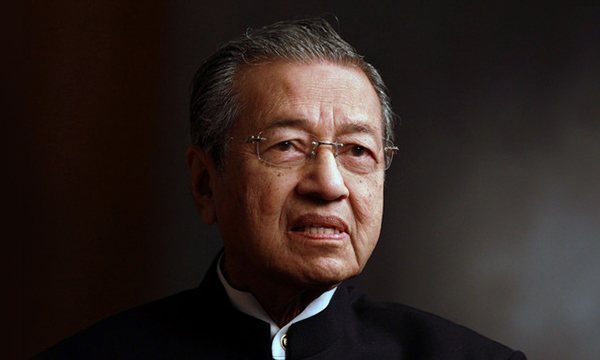By Mathew Maavak, a doctoral candidate in risk foresight at Universiti Teknologi Malaysia
A shock electoral upset has just returned 92-year-old Dr Mahathir Mohamad to the prime ministerial chair in Malaysia. The run-up to this climax was muddled by a miasma of fake news, lurid allegations and outright conspiracy theories from both sides of the political divide. China-baiting was drawn into this tawdry mix despite investments from Chinese Mainland serving as a stabilizing mainstay of the local economy.
 Mahathir Mohamad
Mahathir Mohamad
According to an Economic Intelligence Unit report last year, Malaysia was the fourth-largest recipient of Chinese mainland direct investments – right behind Singapore, United States and China's Hong Kong Special Administrative Region. Although the sum total of Chinese investments in Malaysia has not been adequately tallied, the US$100 billion Forest City project provides a snapshot of the staggering amounts that were invested into the local economy.
While former Prime Minister Najib Razak hailed the investments as an imprimatur of his government's investor-friendly policies, the opposition camp (and new government) accused him of "selling out to China." In reality, one doubts whether foreign consortiums can match the scale, cost-effectiveness and speed of execution of many Chinese-led projects in Malaysia.
Business Compradors
Dr Mahathir has taken issue with the inadequate number of local jobs created by Chinese investments in Malaysia. Overseas Chinese infrastructure projects are known for their heavy reliance on mainland labour, machines and supplies – of the lock, stock and barrel variety – to keep costs, graft and middlemen interference to the lowest possible scale.
Curiously, the backbone of Dr Mahathir's electoral tsunami came from the ethnic Malaysian Chinese community who hailed the global ascent of China. That was until they discovered that mainland business models accommodated as few middlemen as possible.
Many Malaysian consumers save thousands of ringgit each year by purchasing a variety of consumer products directly from China instead of forking out a hefty mark-up at local stores. Unsurprisingly, there are now growing calls to tax online purchases from China. This is not going to help budget-strapped Malaysians who voted in the new administration on the back of complaints over rising living costs. Malaysia's shadow economy has been estimated by various studies to range between 30 percent and 47 percent of its GDP up till 2010.
The anti-China narrative may be couched in terms of multifaceted grievances, such as jobs and the South China Sea but it boils down to commissions for middlemen who contribute little or nothing in terms of value-additions to projects, products or services offered by mainland companies.
Media Compradors
The biggest impediment to the Malaysian economy is not China, but its business modus operandi or the lack of local talent. It is the Malaysian media, which has failed to relay grassroots ideas and innovations to national policy-makers for decades.
The author himself recalls the lament of Dr Mahathir's former national science advisor on the dearth of science journalists in Malaysia, which translates to recurring losses in taxpayer funds. There is an oft-told account of how a fact-finding delegation to the United States, seeking particular expertise in renewable energy technology, were told that the expert they were looking for was a Malaysian academic back home in Kuala Lumpur!
Researchers needing critical economic or scientific data on Malaysia are likely to get them from foreign sources. Publicity-seeking experts are routinely sought for their banal insights. Malaysia is losing its economic and intellectual competitiveness due to entrenched practises of mediocrity promoting mediocrity – egged on by Western interests. This forms the main backdrop to the current anti-China narrative.
Local media stalwarts blame politicians, in particular Dr Mahathir himself (during his previous 22-year reign) for the lack of local media vigour and freedoms. While media restrictions exist, one wonders how proposed articles on topics such as Open Governance could be viewed as subversive.
It is high time to drain the swamp in Malaysia. Dr Mahathir has already indicated the bloated 1.6 million-strong civil service in Malaysia would be pruned to promote economic and government transparency. For decades, successive governments had rewarded personal loyalty with plush posts and contracts. Malaysians have another chance to demand efficient, meritocratic and transparent governance.
The billion-dollar question is whether the new administration can usher in a transparent and vibrant media – one that can explore greater synergies within and abroad. Otherwise, Malaysia's relations with its neighbors and trading partners are bound to deteriorate, along with its economy.
(The opinions expressed here do not necessarily reflect the opinions of Panview or CCTV.com. )

Panview offers a new window of understanding the world as well as China through the views, opinions, and analysis of experts. We also welcome outside submissions, so feel free to send in your own editorials to "globalopinion@vip.cntv.cn" for consideration.
















